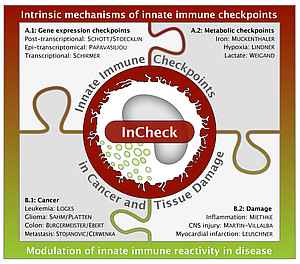Sie befinden sich hier
Inhalt
Subproject A.1.1: Decoding and regulating iron homoestasis in myeloid cells in neuroinflammation.
Within the research area A “Cell intrinsic mechanisms of innate immune checkpoints” principal investigator Lucas Schirmer will lead the subproject “Decoding and regulating iron homoestasis in myeloid cells in neuroinflammation”.
Multiple sclerosis (MS) is the most prevalent chronic inflammatory disease of the central nervous system leading to waves of acute inflammation with sustained immune reactions that are mainly orchestrated by innate immune cell subtypes, such as activated microglia. The inflamed lesion rim, characterized by microglia activation and macrophage recruitment, is a major pathological feature in MS. By single-nucleus RNA-sequencing (snRNA-seq), we identified a CD163- and HAMP-co-expressing disease-specific myeloid cell subtype (among other dysregulated iron pathway transcripts) that specifically mapped to the inflamed rim of chronic-active MS lesions. The aim of the project is to deconvolute and understand the role of dysregulated iron metabolism in myeloid cell subtypes and its role in initiation and progression of demyelinating neuroinflammation. In collaboration with the consortium, in particular with the laboratory of Muckenthaler, we will explore the role of activated myeloid cells in humans and in transgenic mouse models, with an emphasis on the hemoglobin-haptoglobin scavenger receptor CD163, as a novel immune checkpoint in neuroinflammation. The MD student project will focus on transcriptomic tissue mapping utilizing multiplex in situ hybridization assays.
Subproject B.1.1: Modulating innate checkpoints for brain tumor immunotherapy.
Within the research area B “Modulation of innate immune reactivity in disease” principal investigators Katharina Sam and Michael Platten will lead the subproject “Modulating innate checkpoints for brain tumor immunotherapy”.
In malignant gliomas, therapy response is significantly limited by tumor-associated macrophages (TAMs), including brain-resident microglia and monocyte-derived macrophages, which account for up to 50 % of the brain tumor mass. We recently showed that innate treatment resistance could be partially overcome by local irradiation. Thus, we hypothesize that TAM modulation under the conditions induced by irradiation provides an attractive target for optimization of immunotherapy. Within this project, a PhD student will apply genetically modified syngeneic murine glioma models to identify and therapeutically modulate innate checkpoints within the brain tumor microenvironment. Specific aims are to validate the role of myeloid CXCL10 chemokine release for T cell-based glioma immunotherapy and to characterize the innate compartment in gliomas during and after radioimmunotherapy. The MD student will validate previously identified innate cell surface checkpoints in human glioma specimen.
For more information about InCheck and the research areas visit here: https://www.umm.uni-heidelberg.de/grk2727/

